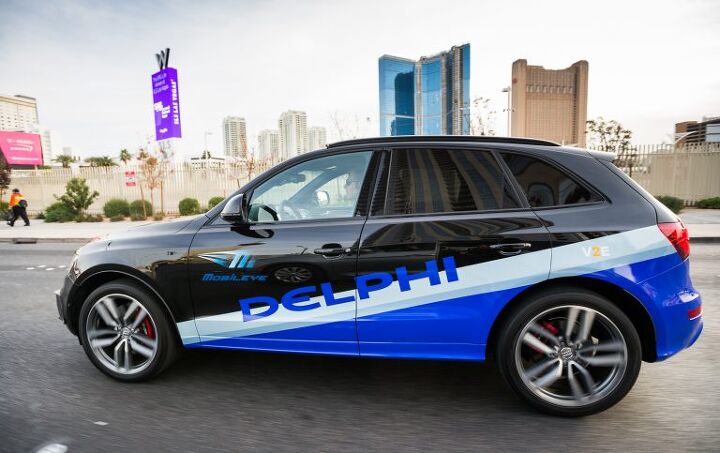#AutomotiveTechnology
Study Shows Nearly Nine in 10 Americans Want Better Fuel Economy, But There's a Problem
A recent study from Consumers Union — the public policy and advocacy division of Consumer Reports — shows continued interest among U.S. residents in seeing automakers improve fuel economy figures, even as gas prices remain fairly low.
While this should come as a shock to no one, nearly nine in 10 surveyed consumers agreed automakers should continue improving fuel efficiency standards on all vehicles. As well, only 30 percent believed manufacturers actually cared about lowering fuel costs for their customers.
This might be true but, then again, why would automakers do such a thing when the general populace has essentially turned its back on economical passenger cars? With little incentive to sell them, especially if the Trump administration alters 2025 emission targets, any top-tier automaker focusing exclusively on building MPG-focused automobiles would be placing itself at major financial risk.
The survey indicated fuel economy as the area perceived to possess the most room for improvement in modern vehicles. However, consumers have not used their wallets to bolster economy car sales. There appears to be a disparity between what the public claims to value and how it actually behaves. At a minimum, consumers may have misunderstood everything it would take to see fleet-wide fuel consumption decline. If they want to see higher MPGs, they’re going to have to make some sacrifices and the survey doesn’t allude to that fact.
Shenanigans: Toyota's 'Flying Car' Doesn't Fly and Isn't a Car
We need to have a candid discussion about flying cars. Automobiles and airplanes entered into the mainstream around the same time, and we’ve talked about combining them into a singular platform ever since. While nobody has successfully pulled it off, we keep acting like the technology is right around the corner. The closest we’ve gotten are the Terrafugia Transition and Pal-V One. However, both of those products make major on-road sacrifices, undergo a pre-flight metamorphosis, and require regular access to a runway. They’re still not representative of anything we’d consider a real car.
Lack of success hasn’t stopped automakers from dabbling in the field of aviation. Toyota has purchased Cartivator Resource Management in the hopes that its “flying car” expertise will yield a vehicle capable of lighting the torch at the 2020 Olympic games in Tokyo. Still, based on the firm’s progress to date, we can only imagine the attempt ending in a globally broadcast fiery disaster.
Uber Gains a Rival in the World of Self-driving Trucks
Waymo has announced it has begun working on self-driving trucks, possibly to further annoy its chief industry rival, Uber Technologies. On Thursday, the Alphabet-owned development team said it was venturing into autonomous trucking, only two weeks after UberFreight’s official launch.
While the ride-hailing giant has been working on self-driving trucks since its acquisition of Otto last year, the timing of the two more recent announcements are suspiciously close.
Toyota Takes an Open-source Approach to Infotainment, Establishes New Industry Standard
A modestly priced new vehicle costs roughly the same as a bathtub full of smartphones. However, if you want to check your email or get an update on the weather, you’ll find the car at a clear disadvantage. Automakers are beginning to bill themselves as tech companies, but the majority have yet to master the art of integrating a pleasurable electronic interface. While manufacturers certainly don’t need cutting-edge displays to construct a competent mode of transportation, consumers expect more from their automobiles. Now, the industry’s competitive spirit is driving things forward.
One way of delivering on those growing expectations is to switch to an open-source platform that allows software developers to get new applications onto devices lickety-split. It’s the path Toyota has decided to take by running a Linux-based platform on the revamped Camry. With those advantages comes some potential risks, but it hasn’t stopped automakers from pushing for a standardized platform more representative of mobile devices.
Audi's Next-Gen A8 Adds Mild Hybrid Arrangement as Standard; Other Models to Follow
There’s a bit of an automotive renaissance occurring just below the radar. While pure electrics and plug-in hybrids garner endless headlines, several luxury brands are sneaking more mild hybrid arrangements under their vehicles’ hoods via a 48-volt electrical system.
Audi is a firm believer in the technology and is making moves to implement the system in numerous vehicles in its lineup, starting with the fourth-generation A8 arriving later this year. Combining regenerative braking with a small lithium battery and belt-driven alternator, the system harnesses wasted energy and is a more affordable way to tap into the benefits of hybridization. So affordable, automakers are using the KERS-like system on models as standard equipment, not a optional extra.
In this regard, Audi’s A8 is no different. The next generations of the A6 and A7 will also use the technology.
Study: People Don't Trust Uber or Lyft to Build Self-Driving Cars
A recent study has discovered most drivers prefer to see traditional automakers developing their autonomous cars, not ride-hailing companies like Uber or Lyft.
In Inrix’s Connected & Autonomous Vehicle Consumer Survey, 5,045 drivers from five countries weighed in on the subject. Roughly 30 percent of the pool indicated they “trusted” established automotive manufacturers to build their self-driving cars, with 20 percent feeling similarly about tech companies like Google’s Waymo. Only 4 percent said they had confidence in ride-hailing providers.
Some of that could be down to Uber’s lackluster performance. The company’s autonomous development efforts has seen it butting heads with regulators, annoying the entire city of Pittsburgh, and weathering high-profile traffic incidents.
Quebecois College Students Build Car Capable of 2,713 Miles Per Gallon
Students from the Université Laval of Quebec won the the 11th annual Shell Eco-marathon Americas competition in Detroit for the second time in a row last month. The energy-efficient gasoline powered prototype managed an impressive 2713.1 miles per gallon on an internal combustion motor. However, the unit was only a two horsepower engine and spent the majority of its journey coasting at low speeds.
Encouraging automotive innovation should always be praised but, considering Shell’s guidelines for these events, one would hope for more. The competition has university students designing a prototype car using any combustible fuel, mainly gasoline or hydrogen, in an attempt to out-economy their rivals on a Michigan test course — which is great. The problem is the majority of these vehicles could be outperformed by a reasonably fit individual on a bicycle.
The Replacement for Displacement: Plotting Our Path Out of the Malaise Era
Around the time of the Bicentennial, 300 horsepower was reserved for from-the-factory supercars and custom builds aimed at the drag strip. Today, you can find family sedans eclipsing that benchmark without a lot of trouble. Compare the first decade of Toyota Corollas to hit North American shores to their modern day equivalents and you’ll note that 0 to 60 time have been almost halved.
It’s the same with most models. A few years ago, I had the privilege of driving a well-maintained 1977 Oldsmobile Omega and wondered how enthusiasm ever survived malaise era automobiles. It must have been the gorgeous styling keeping us going.
Modern cars aren’t just more powerful, they’re also far more efficient and significantly less dirty. Additional safety regulations and standard equipment should have left us with bogged-down fuel hogs, yet automakers have managed to roll with the punches — not just maintaining the status quo but routinely moving it forward. However, to really appreciate just how far we’ve come you need to see those decades of progress plotted.
Waymo Partners With Lyft to Give Uber the Middle Finger
Waymo, the autonomous automotive firm owned by Google parent Alphabet, and Uber’s chief ride-hailing rival Lyft have entered into a self-driving partnership — seemingly to do little more than stick it to Big U.
Lyft is already in a partnership with General Motors to produce computer-controlled Chevrolet test vehicles in 2018, while Waymo has a deal with Fiat Chrysler to use the Pacifica as its primary R&D platform. It’s difficult to parse out what the two can offer each other beyond a mutual hatred for Uber. Business partnerships can rarely be distilled down to a disdain of a third party but, in this instance, that certainly makes the most sense.
Despite being involved in litigations with Waymo that could result in a total shutdown of its autonomous development efforts, Uber has the largest ride-sharing fleet of any company and is positioned near the front of the self-driving race. Meanwhile, Lyft has only just entered the self-driving arena.
Judge Refers Uber Trade Theft Allegations to Criminal Prosecutors as Case Goes Public
Waymo’s lawsuit against Uber Technologies’ alleged theft and usage of autonomous trade secrets is going to trial.
Judge William Alsup ruled Uber could not force the case into private arbitration and is referring the matter to the United States Attorney for a very public investigation.
This is everything the ride-hailing company didn’t want.
Uber Builds New AI Team North of the Border as It Battles Lawsuit in the U.S.
Uber must be feeling somewhat confident in its legal battle with Waymo over stolen autonomous tech, because it’s assembling a new artificial intelligence team in Canada.
The group will serve as part of Uber’s Advanced Technologies Group, which has found itself at the core of the lawsuit, and focus on enhancing the company’s autonomous vehicle software.
Advancements in Tech Makes More Wrecked Vehicles Too Expensive to Repair
Safety enhancements are, undoubtedly, a good thing. People are walking away from wrecks that would have been fatal a few decades earlier and crash avoidance systems can keep inattentive drivers out of trouble altogether. The downside is that these features have made vehicles more expensive to purchase and repair.
Bob Tschippert, the senior vice president of underwriter Risk Theory, says that advancements in technologies have made vehicle repairs so costly that insurance companies have begun declaring substantially more injured cars a total loss. “In the past, if you had a front-end collision, you had damage to the engine or the front end,” Tschippert explained. “But now, with the number of airbags that can run from $1,000 up to $4,000 and all the sensors up front, you’re seeing more totals.”
Judge Says There's 'No Smoking Gun' in Waymo's Autonomous Car Case Against Uber
The U.S. judge hearing Alphabet and Waymo’s case against Uber Technologies over pilfered trade secrets stated Wednesday that the inquest lacked clear evidence of any wrongdoing — making his decision on whether to issue an injunction against the ride-hailing service a difficult one.
U.S. District Judge William Alsup — who has already proven himself a no-nonsense individual — explained while there was undisputed proof engineer Anthony Levandowski had downloaded 9.7 gigabytes of company files prior to leaving Alphabet Inc.’s autonomous vehicle program, there wasn’t enough to indicate he conspired directly with Uber to share those trade secrets.
With nearly the entirety of the case revolving around that singular incident, this is a major problem for Waymo.
Delphi Gets Its Own Spinoff, Core Focus Now on Autonomy and EVs
Automotive supplier Delphi announced plans on Wednesday to spin off all operations tied to internal combustion engines and focus solely on electric propulsion and autonomous vehicles.
The move boosted share prices while underscoring the problems facing the industry’s old guard. That’s not to suggest that internal combustion engines are going to vanish anytime soon, but the investors who fund their development seem progressively less interested in backing them. An interesting choice, considering EV-maker Tesla is valued well above a traditional manufacturer like Ford — despite not being nearly as profitable.
Delphi says it will spin off its $4.5 billion powertrain division into a separate publicly traded company by early 2018 and is considering a new name.
Porsche's A-pillar Airbag Patent Could Prevent Serious Headaches for Convertible Owners
A segment of the automotive enthusiast community holds a real prejudice against convertibles. While the majority of the ire stems from an irrational bitterness or assumption that any car that sacrifices any amount body stiffness for style is inherently wrong, there is one valid complaint: most convertibles are less safe in a crash than a hardtop.
With that in mind, Porsche has patented an airbag concealed within the A-pillar specifically designed to protect soft-top occupants in the event that the windshield frame bends toward their fragile skulls during an accident — a handy feature for a vehicle lacking roof support. However, there is no reason the system couldn’t also be implemented in vehicles with a rigid ceiling.





























Recent Comments